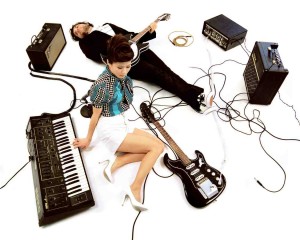Originally appearing in Beatroute Magazine.
Yuki Chikudate doesn’t think definition gets you anywhere. Or rather, attempting to define her band, Asobi Seksu – the New York-based shoegaze group – is a fool’s errand.
“This question of fitting into a genre or fitting into a specific sound, it’s always a question that people ask bands,†she says. “I never even really know if that clarifies anything or if anyone is every really satisfied.†Indeed, following the release of the band’s breakout album Citrus, there was an almost fevered attempt to define the band as one genre or another. “We have always agreed with the shoegaze thing; it’s definitely part of our sound,†she says, listing off current and prior influences that have been prescribed to the band almost since its inception. “Hopefully we are growing and evolving as a band with each record.â€
Despite the collective effort of journalists attempting to define the band musically, Chikudate admits there are clearly other factors at play. “The fact that I look different, I’m an Asian female…it’s very confusing, I guess, for some people.†The questions arising out of their sound (fuzzed out guitars and lyrics lapsing into Japanese at will), ethnicity and the name of the group (Asobi Seksu means “playful sex†in Japanese) are surprising to Chikudate. “Maybe I’m being naive…I just don’t know where that desire (to define us) comes from.â€
Just when audiences were getting a handle on the Asobi Seksu sound and talking in earnest about standout tracks off Citrus such as “New Years†and “Red Sea,†the band threw another curveball and released Hush, an album that leans very little on an established formula. The result is clear in songs like “Transparence†and “Gliss,†representing a side of the band more concerned with tight thesis statements than thick dissonance. “We toured with Citrus for about three years and…we kinda got tired.†She laughs and adds, “I think more than anything our ears got tired.†She says the evolution was a natural reaction to a fatigue with the successful sound on Citrus, and the result was a more “minimalist place…a stark place,†born out of keyboard and drum-centric songwriting. “We wanted to go with something a little more uncomfortable.â€
Following Hush, Chikudate and co-mastermind James Hanna recorded a remix album of sorts called Rewolf. The album features re-imaginings and acoustic renditions of their songs, and, despite being another departure, ties together their material into a cohesive package where most bands at this stage would have merely put out a token EP. The record was the product of a short recording stint at Olympic Records, the legendary London studio where they competed for studio time with U2. The studio closed its doors shortly after Rewolf had wrapped, so a history coloured with everyone from the Beatles to Björk is capped with Asobi Seksu. “You look at the list and it’s legends, and then there’s us. It’s kind of comical. We were honoured.â€
Despite all the hand wringing and questions about the band, it’s clear Asobi Seksu has enough problems worth solving to remain intriguing. Chikudate is able to internalize the conflict. “I take it as a compliment, that people are left with more questions than answers.†She adds, “I guess it’s not a bad thing, being difficult to define.â€
